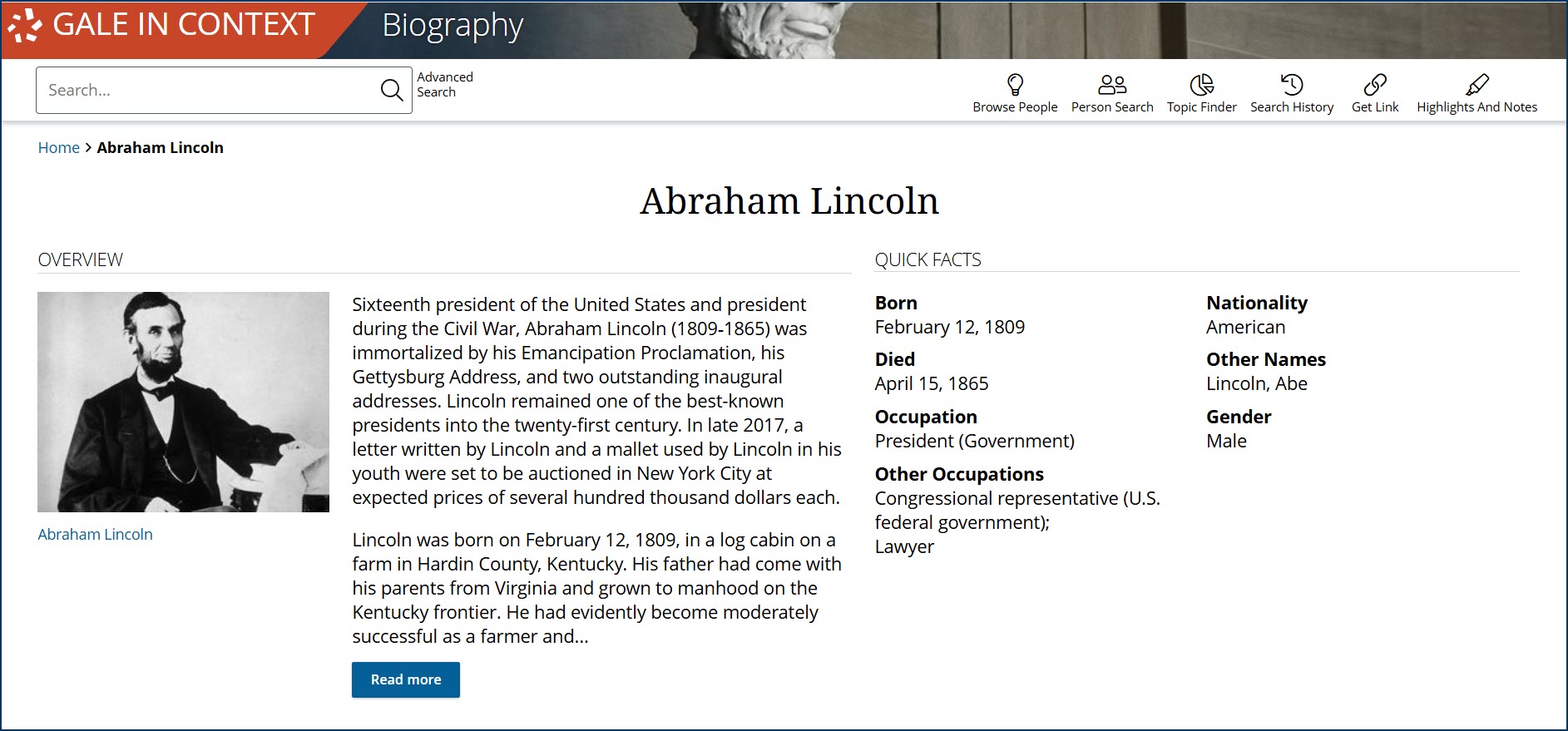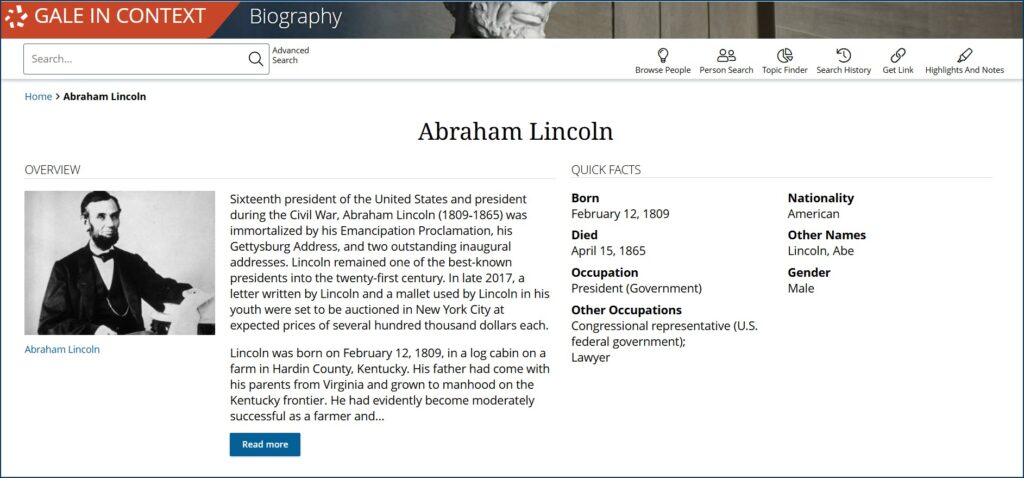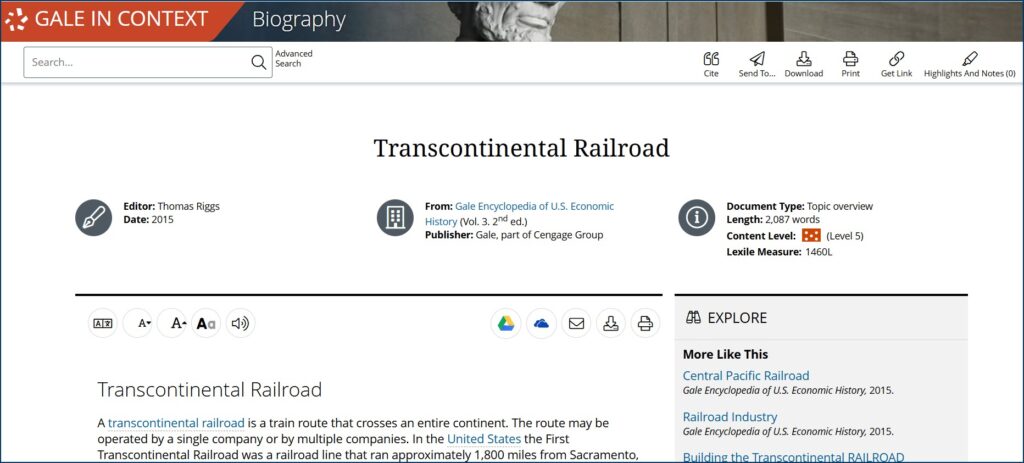| By Gale Staff |
Few figures in American history command such enduring fascination as Abraham Lincoln. Born in a one-room log cabin in Kentucky with limited access to schooling, Lincoln nonetheless cultivated his sharp intellect by reading borrowed books even while toiling on the family farm.
Lincoln’s intellectual drive and work ethic propelled him from humble beginnings to the presidency, where his steady resolve held the Union together when it seemed destined to fracture beyond repair.
With his birthday approaching on February 12, teachers can look to Gale In Context: Biography for educator-approved resources that introduce fascinating ways to explore Lincoln’s life at every grade level. The Abraham Lincoln topic page features hundreds of relevant resources, such as biographies, historical analyses, images, audio files, and modern perspectives on the 16th president’s impact—all accessible from a single portal.
Discover the content you need to deliver engaging, curriculum-aligned instruction about Lincoln’s life. Gale In Context: Biography fosters young learners’ curiosity with diverse content to support all learning styles and interests.
For Elementary Classrooms: Lincoln’s Early Years
Lincoln’s childhood introduces young learners to life on the American frontier in the early 19th century. Growing up in Kentucky and Indiana, Lincoln’s family faced the realities of a rapidly expanding nation, including the challenges of subsistence farming and the limited opportunities for formal education.
These early experiences connect students with the broader historical context of westward expansion and explain how Lincoln’s upbringing shaped his later contributions to American history.
Honest Abe’s Humble Beginnings
Abraham Lincoln’s story begins in the most modest of circumstances. The future president was born in 1809 in Kentucky, where he lived with his family in a one-room log cabin. As a frontier family, the Lincolns knew hardship and depended on unreliable farming profits to make ends meet.
Lincoln’s formal education was limited to the wintertime, as he had to stay home the rest of the year to help the family with the farmwork. Despite only sporadically attending school, he developed a passion for reading. Borrowing books from his neighbors and reading by the light of the fireplace, Lincoln taught himself history, politics, and law, which would serve him well in his future role as president.
Along with a love for learning, Lincoln also demonstrated a strong work ethic. Historical accounts of him as a young man include anecdotes such as walking several miles to return a few cents to a customer after Lincoln gave incorrect change while clerking. Records from his time in Indiana and Illinois similarly describe him helping nearby farmers with tasks like log splitting and building furniture.
Discussion Idea: After learning about Lincoln’s early years, pull resources from Gale In Context: Biography about the American frontier, from the life stories of early pioneers to reference articles on topics like prairies, westward expansion, and indigenous peoples’ land claims. Discuss the challenges pioneers faced as they settled the frontier and how these efforts often came at the expense of indigenous peoples, whose lives were uprooted. Ask students to consider how growing up on these contested lands might have shaped Lincoln’s perspective on conflict, community, and leadership in a divided nation.
For Middle and High School Classrooms: The Philosophy of Lincoln’s Leadership
As students progress into middle and high school, their ability to grapple with more complex historical narratives grows. Lessons that once focused on Lincoln’s early life can now evolve to explore more nuanced topics.
For example, Lincoln’s internal struggle between his moral opposition to slavery and his responsibility to uphold the Constitution deeply troubled him, as did his decision to use the Emancipation Proclamation as a wartime strategy. Discussions might also include topics like how his vision for Reconstruction took shape even before the war ended, or his use of the Union Pacific transcontinental railroad to reunite the nation.
The strength of Gale In Context: Biography is that it provides the flexibility necessary to meet a wide spectrum of needs, providing teachers with resources to tailor lessons to different developmental levels within the same classroom.
Lincoln’s First Inauguration and Attempts at Reconciliation
When Lincoln took office as the 16th president of the United States on March 4, 1861, seven Southern states—Alabama, Florida, Georgia, Louisiana, Mississippi, South Carolina, and Texas—had already seceded from the Union.
In his inaugural address, Lincoln appealed directly to the Southern states, using his abilities as an orator to call for compromise and reconciliation. Though Lincoln viewed slavery as a “monstrous injustice,” he tried to reassure the South that he would not go against the Constitution. He stated, “I have no purpose, directly or indirectly, to interfere with the institution of slavery in the States where it exists. I believe I have no lawful right to do so, and I have no inclination to do so.”
Instead, he emphasized that their act of secession was unconstitutional and that the nation must remain united. Despite these efforts, tensions rose, and the Civil War began just a month into his presidency.
Discussion Idea: Lincoln described slavery as a “monstrous injustice,” but reassured the South he would not interfere with it where it already existed. Why do you think he took this approach? For students ready for more in-depth and complex discussion, consider addressing questions about whether Lincoln’s efforts at compromise demonstrated strong leadership or a failure to act on principle. How do his decisions provide insight into the challenges of leadership in a national crisis?
The Nation at War
Once the Civil War began in April 1861, Lincoln’s leadership was tested in unprecedented ways. His primary goal was clear: to preserve the Union. However, as the war progressed, Lincoln faced mounting pressures to address the institution of slavery, which was central to the conflict.
Lincoln issued the Emancipation Proclamation in 1863, freeing enslaved people in Confederate-held territories. This landmark decision is often celebrated as a moral victory, but at the same time, it was also a carefully calculated wartime strategy. In his framing of emancipation as a military necessity, Lincoln aimed to weaken the Confederacy’s labor force, which would, in turn, uproot their economy.
This period of Lincoln’s presidency saw him facing dissent from his own party, which demanded faster action toward ending slavery. Simultaneously, he managed the enormous toll of a prolonged war on a deeply divided nation, proving himself to be a pragmatic military leader who held fast to the democratic ideals on which the country was founded.
Discussion Idea: The Emancipation Proclamation was a military measure with profound moral implications. Why do you think Lincoln chose to emphasize its strategic importance in the context of the war? How might this dual framing have influenced public perception at the time? For more advanced learners, consider discussing whether Lincoln presenting emancipation as a military necessity diminished its morality. Why or why not?
The End of the Conflict
By April 1865, four years to the month after it began, the Civil War was drawing to a close. Confederate General Robert E. Lee’s surrender at Appomattox Courthouse marked the beginning of the end of the conflict. Still, Lincoln’s focus had already shifted to the challenge ahead: Reconstruction. His vision for the years following the conflict emphasized “malice toward none” and “charity for all,” setting the stage for reconciliation rather than retribution.
Lincoln’s assassination on April 14, 1865, just days after Lee’s surrender, cut short his plans for the nation’s recovery. John Wilkes Booth, a Confederate sympathizer, shot Lincoln at Ford’s Theatre, plunging the country into mourning and leaving the immense task of Reconstruction to his successors.
Without Lincoln’s steady leadership, Reconstruction took a harsher turn under different administrations, and many of his ideals for reunification and racial equality went unrealized.
Discussion Idea: In the Gettysburg Address, Lincoln spoke of “government of the people, by the people, for the people.” How do you think his leadership during the Civil War reflected that principle? How might the Reconstruction period have been different if Lincoln had lived to guide it himself?
If you are interested in bringing Gale In Context: Biography to your classroom to support research and lesson planning, contact your local Gale sales representative today!



